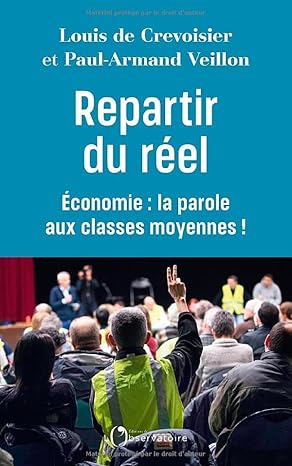This essay answers a fundamental question that is shared by half of the French: how to meet the economic expectations and social aspirations of the French middle classes. The authors recall that this was already the objective of the government during the Thirty Glorious Years: social ascent, improvement of the standard of living, economic and political stability. Half a century later, these objectives remain relevant when reading the grievance books written by more than 700,000 French people after the “yellow vests” crisis. The authors note that the proposals formulated in these notebooks have never really been the subject of in-depth analysis, and even less so of concrete application. This implies moving from a macroeconomic vision to a microeconomic approach, from theoretical modeling to pragmatic representation, and from “false populist promises” to sustainable projects.
The authors formulate proposals to “rebuild the middle class”, which has been “excluded from the social model” and battered by crises, inflation, taxation, over-regulation, and income redistribution. They propose to “start from experience” and build a “new economic grammar based on the essential issues of everyday life”. In the first part, they recommend ensuring more economic security for the French, in particular thanks to a reduction in the cost of labor, a fairer distribution of the value created, the establishment of a “wage shield” between assets and inactive, the establishment of a “more incentive” and “more virtuous” tax system. They propose to “protect the purchasing power” of the French, through a better valorization of energy (especially electricity) and a set of reforms concerning VAT, complementary health and consumer goods prices. In the second part, they advocate “a sustainable way of life”, including a renovation of medium-sized cities, a revision of mobility systems, a “selected reindustrialization”… In the third part, they suggest offering new opportunities to the middle classes, by revaluing scientific studies and promoting research, a better access for children of the popular and middle classes to higher education and to careers as executives and liberal professions. They advocate a reform of inheritance tax, and more selective incentives for innovation (they consider the start-up nation program launched in 2017 too elitist and the Research Tax Credit ineffective). They conclude with some common-sense advice to economists who are considered too theoretical, to public services that are insufficiently close to the public, and to political leaders who are disconnected from citizens.
With their common sense advice, the authors expose themselves to criticism from the working classes – who make up the majority of the “yellow vests” authors of the “citizens’ notebooks” -, the upper classes – who consider themselves overtaxed -, but also the middle classes themselves, who are particularly divided (active-retired, urban-rural, employees-independent, heirs-creators…).
The authors draw their reflections from their experiences in public service, from a careful reading of the grievance books and, above all, from the latest reports, books, and speeches of the most influential economists and industrialists. The book deserves to be read by all French people, but especially by elected officials in search of re-election, by economists in search of notoriety, and by the media in search of readers.
Louis de Crevoisier (HEC-ENA-Inspection des finances) is a senior official at the Ministry of Economy and Paul-Armand Veillon ((X-ENSAE) is an administrator at INSEE.
Note by J-J. Pluchart


